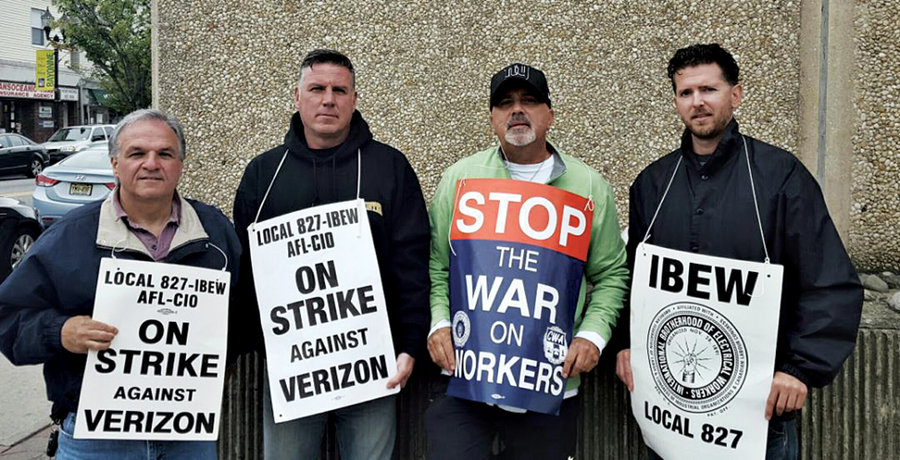The largest national labor strike in nearly five years hit the streets of Bayonne this month as workers began demonstrating outside the Verizon facility on Broadway. Forty thousand Verizon workers, represented by the Communications Workers of America (CWA) and International Brotherhood of Electrical Workers (IBEW) and made up mostly of technicians and customer-service representatives, went on strike April 13 after being without a contract since it expired in August. Union officials already agreed to shoulder a larger healthcare cost, but negotiations turned sour when Verizon asked for the right to move technicians to sites outside their home state for months, to freeze pension benefits at 30 years, and more authority in outsourcing work.
The workers’ fight
The demonstrators wear shirts reading “Stop the war on workers.” A 10-foot inflatable rat, called the “Union Rat” was tied to a pickup truck as picketers demonstrated. Strikers were not allowed to speak with the media about the strike, deferring to Rob Speer, president of Local 827, a branch of the IBEW.
Speer calls Verizon’s contract “retrogressive.” He said, “They have a terrific product and we continue to work with them to promote their product. Now they’re biting the hand that’s been feeding them. We maintain their product, we repair the product.”
Of the workers’ grievances, outsourcing work, especially to a different country, strikes a nerve. “The amount of work they’re sending overseas is obscene,” Speer said. “It’s like a non-American company … They should be ashamed of themselves.” Call centers in Livingston handle 9 percent of calls that originate in New Jersey. “The rest go out of state or overseas.”
Asked about Verizon wanting to move technicians over state lines for up to two months, Speer said, “It’s ridiculous. We’re asking for a fair contract where people don’t have to work overtime to make ends meet. They need time with their families.” He also argues that Verizon’s outsourcing will de-localize the technician-customer relationship. “Normally, the person who comes into your home is a Jersey person. Now there are people coming from all over coming into your home.”
“This is a huge problem. It’s what happens when you come against a company that has unlimited funds.” – Frank Ferrante
____________
Bayonne’s bone
Frank Ferrante, a technician in Bayonne who has been working for Verizon for 26 years, is no more pleased than his union president. He’s concerned for the customers who are receiving lower quality service while longtime workers are on strike. “They’re not getting the proper quality service that they deserve by trained, qualified technicians,” he said. “They’re sending people who have never worked out in the field. They were sent away to train for a couple weeks. In my career, there’s constant training going on. You can get killed if you don’t know how to do certain things properly. You’re close to power and electricity.”
Verizon said in a statement that it has been preparing for the “work stoppage” for a year: “Thousands of non-union Verizon employees and business partners have undergone extensive training in various network and customer service functions, including FiOS and copper repair and network maintenance and general customer service functions.”
Ray McConville, a Verizon media representative said, “[The technicians] are properly trained, very well trained and they’re doing a great job. Are they going to be as good as our union technicians who have been doing this for year? No, of course not, but we prepared for this seriously.”
Looking up, looking down
After being out of work for a month, Ferrante remains optimistic. “I think we’ll get back,” he said. “It’s just a matter of when. It’s a matter of if they’ll give us a fair contract. They’re not bargaining in good faith.” He says those on the outside should look past the 40,000 workers. “It’s not just us. It’s affecting well over 200,000 people. Family members and children, dealing with health insurance and time away.” There are about 50-75 Bayonne workers affected by the strike, according the Ferrante.
What does the strike mean for labor elsewhere? “This is a huge problem,” Ferrante said. “It’s what happens when you come against a company that has unlimited funds. They make $1.8 billion a month profit. Thirty-nine billion dollars’ profit in the last three years.” Ferrante also senses a changing city and a changing economy. “It used to be that you had a good job,” he said. “You weren’t getting rich, but you worked. That’s being pushed out. It’s going to be either you’re poor or you’re rich. That’s why this fight is so important.”
A changing business
It’s no coincidence that employees from Verizon’s wireless division are not going on strike. Wireless is thriving with phones, internet, and electric charging. Who uses a land line anymore? “The business has shifted,” said McConville. “The landlines used to be a dominant part of the business. We used to be a monopoly with no competition. Now the best part of our line business is our broadband and TV side of this. And we’ve got a lot of good competition.”
Contract negotiations are difficult for both sides. “It’s really slow,” Speer said, “but I hope the company comes to their senses. I’ve been here for 35-plus years. The company has always treated us well until recently. Between the 2012 bargaining and the bargaining now, we’ve taken steps back.”
McConville said, “What we have asked for is additional flexibility with how we can route calls and deploy our workforce. For example, we want flexibility to send technicians from Hoboken across the river to Manhattan. Those are the real things we’re looking for in this contract.”
Rory Pasquariello may be reached at roryp@hudsonreporter.com.
